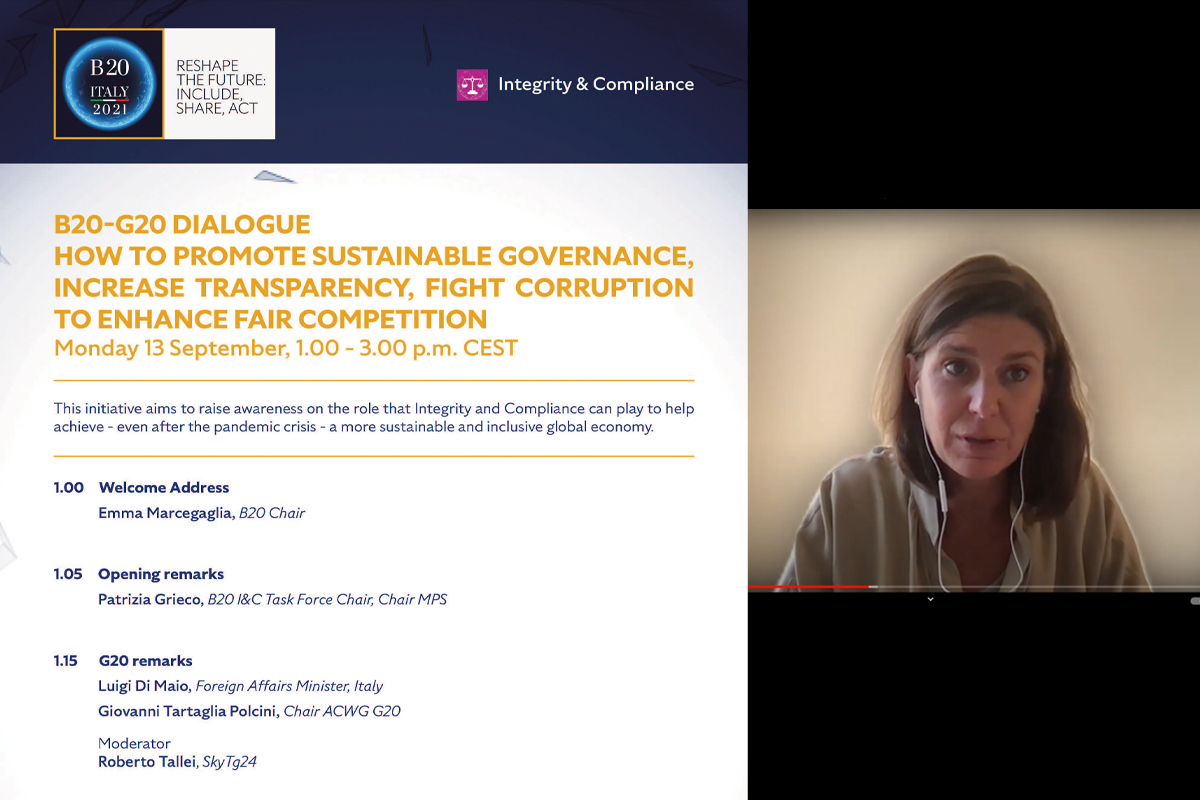B20-G20 dialogue: G20 Member States need a multi-stakeholder approach to integrity in procurement

Speaking at a B20-G20 dialogue on 13 September, the Basel Institute’s Managing Director Gretta Fenner called on G20 Member States to commit to and support the implementation of a multi-stakeholder approach to promoting integrity in procurement.
In concrete terms, she said, this means adopting proven Collective Action tools such as Integrity Pacts and High Level Reporting Mechanisms. in public tenders.
The event, focused on “How to promote sustainable governance, increase transparency, fight corruption to enhance fair competition”, was organised by the B20 Italy Integrity and Compliance Task Force, of which the Basel Institute on Governance is proud to be a Network Partner.
The aim was to raise awareness on the role that integrity and compliance can play to help achieve – even after the pandemic crisis – a more sustainable and inclusive global economy. The dialogues bring leading B20 and G20 representatives together to foster mutual understanding and coordinate on key policy recommendations.
The panel on which Gretta spoke dealt with the Task Force’s policy recommendation 1.3 to “foster integrity and transparency through the procurement cycle”. Maria Fernanda Garza, CEO of Orestia, and Michele Crisostomo, Chair of ENEL, also spoke on the topic, following a keynote speech by Antonio Matonti, Task Force Manager.
You can view the full event recording on YouTube (Gretta Fenner speaks at minute 53:30), or skip straight to her words below.
Meanwhile, if you wish to find out more about how the B20 process works and its track record on anti-corruption and integrity topics:
- See our new online information centre on the B20 and anti-corruption, created with the support of the Siemens Integrity Initiative.
- Our recent paper also analyses how B20 recommendations have been taken up by the G20, and what might make the process more effective.
- In the run-up to this event, a group of B20 Integrity & Compliance Task Force members with a long-standing engagement and strong commitment to the B20's impact and success put together some ideas and suggestions to support G20 and B20 presidencies on issues related to B20 governance and G20-B20 engagement.
Enhancing integrity in the procurement cycle – the High Level Reporting Mechanism
“Thank you to the Italian B20 presidency, and in particular the Integrity & Compliance Task Force, for facilitating this important B20-G20 Dialogue. Thank you also for the excellent and constructive leadership throughout the 2021 B20 Italy cycle.
Providing a platform for active engagement and exchange between the B20 Integrity & Compliance Task Force and their G20 counterparts is especially important this year with the new G20 Anti-Corruption Action Plan being developed. The Action Plan will guide the G20 anti-corruption work over the next three years.
Providing an opportunity to further align approaches and exchange ideas can be particularly impactful for topics such as public procurement, where interactions between companies and public officials are inevitable.
Every new corruption scandal that hits the headlines and involves a big publicly financed project demonstrates that integrity and transparency make a lot of sense from a business perspective.
Investors are increasingly asking for companies to demonstrate not only a vague commitment but an actual track record of compliance. At least those investors that companies want to have – those that are striving for long-term success which adds to the companies’ bottom lines, to shareholder profit and to the public good.
Ignoring corruption – let alone actively tolerating it or engaging in corruption – is simply no longer tolerated. It’s very bad business.
Every one of these scandals also demonstrates that transparent and responsible conduct in procurement is not a one-way street. It requires the business community and governments to come together and collectively address anti-competitive and corrupt behaviour.
Companies have long understood this, and the continued work of B20 member companies and organisations in the field of integrity and transparency illustrates that.
That’s why the B20 calls on the G20, as it has done in many previous cycles, to commit to and support the implementation of a multistakeholder approach to promoting integrity in procurement. It’s a two-way street, and that’s why Collective Action is not only the right thing to do, it is unavoidable.
Over the years, the B20 has continuously advocated for G20 member countries to establish tools of that nature, such as Integrity Pacts and/or High Level Reporting Mechanisms. It has also advocated for governments to engage in existing initiatives that facilitate transparency and oversight for public projects, for example CoST – the Infrastructure Transparency Initiative or the Open Contracting Partnership.
This is not just about integrity and transparency. It is critical in order to bolster competitiveness and ensure that public funds are invested in a sound manner that yield the intended results.
Another such tool that the B20 have long advocated for, and for which we hope to gain a lot more uptake by G20 Member States, is the High Level Reporting Mechanism.
The HLRM, as we call it, is an innovative procurement integrity tool that was co-developed by the OECD, Transparency International and the Basel Institute on Governance. It allows for early detection and eradication of anti-competitive and corrupt behaviour throughout the tendering and award phase of public projects.
The HLRM is built on three main pillars:
- Setting up a secure and easily accessible communication channel through which the stakeholders can raise alerts about potential bribery situations. To ensure there is trust in the mechanism, it is designed through a collaborative process with contribution from the public sector, business and civil society.
- Providing a rapid and timely response through a designated independent panel of experts that quickly analyses the alert and gathers all necessary information. Through open discussion and mediation with all relevant actors, the issue is resolved with minimal loss of time and money. This allows the project to continue smoothly, with enhanced levels of trust between public and private stakeholders.
- The mechanism needs to be supported by the highest level of government to ensure that the findings of the independent panel and resulting resolution can be followed up appropriately.
The methodology of the HLRM is kept simple and is designed to be tailored to the context of each country and project. This allows the HLRM to be flexible in finding practicable and collaborative solutions that are tailored to the county or project context.
We have seen some mention and general support for these types of anti-corruption initiatives at the G20 level. But we sincerely hope that the G20 will consider a much more explicit inclusion of such mechanisms in the G20 Anti-Corruption Action Plan. We also hope we will see the inclusion of concrete activities that include the private sector to strengthen integrity and transparency in procurement in the G20 Anti-Corruption Working Group country implementation plans.
Ensuring transparency and integrity throughout the procurement cycle requires commitment from both sides. We believe the B20 and G20 are uniquely positioned to facilitate a more impactful engagement by leveraging and translating the vast knowledge and experiences that both the business community and the G20 Member States bring to the table into action and impact on the ground.
We hope, and we trust, the call by B20 companies and organisations is heard by G20 Member States and that we can work closely together over the coming years to make these calls and commitments reality.
– Gretta Fenner, Basel Institute on Governance



